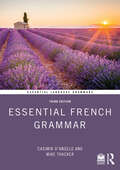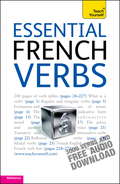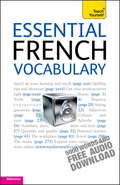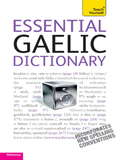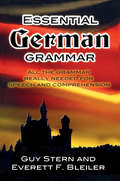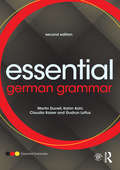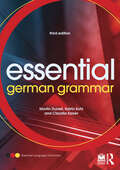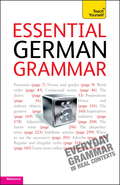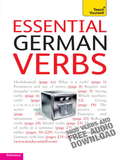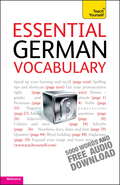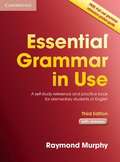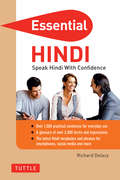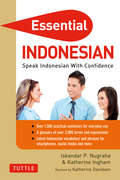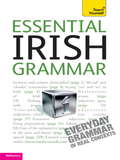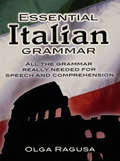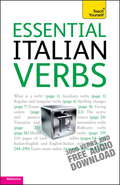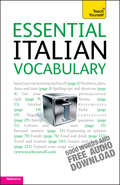- Table View
- List View
Essential French Grammar (Essential Language Grammars)
by Mike Thacker Casimir d'AngeloEssential French Grammar is a student-friendly French grammar designed to give learners a firm foundation on which to build a real understanding of both spoken and written French. Clear explanations of grammar are supported by contemporary examples, lively cartoon drawings, and a variety of exercises.Key features of the textbook include: each grammar point explained initially with reference to English parallels between English and French provided where relevant ‘Key points’ boxes and tables that summarize grammar concepts real-life language examples in French, with English translations a variety of exercises to reinforce learning a contemporary primary source or literary extract to illustrate grammar in context detailed coverage of punctuation, accents, spelling, and the specific sounds of French An introductory chapter describes the lexical and grammatical differences between French and English and a glossary of grammatical terms in French and English, useful verb tables, and an exercise key are also provided, making this an ideal resource for both independent and class-based learners. This third edition offers additional activities throughout, describes the much-debated practice of inclusive language in French and includes a brief history of the influence of French words on English vocabulary. Further grammar practice, in the form of quizzes, is to be found in the instructor and student resources for Essential French Grammar at www.routledge.com/cw/essential-grammars.An innovative reference grammar and workbook for intermediate and advanced undergraduate students of French, Essential French Grammar is ideal for students at CEFR levels B1 to C1, or Intermediate High to Advanced on the ACTFL scale.
Essential French Verbs: Teach Yourself
by Marie-Therese WestonEssential French Verbs is the course for you if you need help with your study of French. This fully revised edition of our best-selling course now comes with free downloadable audio support containing hints on how to learn verbs effectively.The aim of this book is to help you improve your command of French by focusing on one aspect of language learning that invariably causes difficulties - verbs and the way they behave.Whether you are a complete beginner or a relatively advanced learner, you can consult the book when you need to know the form of a verb quickly.The introductory section gives you a complete overview of French verbs and how they work in the various tenses.Essential French Verbs contains:- full coverage of the main tenses for 200 frequently used French verbs arranged alphabetically for quick and easy reference- examples of the verbs in everyday use, with colloquial expressions and words sharing the same origin- a French-English verb list of approximately 3000 verbs with details of the patterns they follow- an English-French verb list giving the most frequently used English verbs in French with details of the patterns they follow- free downloadable audio support with hints on how to learn verbsLearn effortlessly with a new, easy-to-read page design and interactive features:NOT GOT MUCH TIME?One, five and ten-minute introductions to key principles to get you started.AUTHOR INSIGHTSLots of instant help with common problems and quick tips for success, based on the author's many years of experience.USEFUL VOCABULARYEasy to find and learn, to build a solid foundation for speaking.ONLINE TESTSTests to help you keep track of your progress.EXTEND YOUR KNOWLEDGEExtra online articles at: www.teachyourself.com to give you a richer understanding of the culture and history of France.
Essential French Verbs: Teach Yourself
by Marie-Therese WestonEssential French Verbs is the course for you if you need help with your study of French. This fully revised edition of our best-selling course now comes with free downloadable audio support containing hints on how to learn verbs effectively.The aim of this book is to help you improve your command of French by focusing on one aspect of language learning that invariably causes difficulties - verbs and the way they behave.Whether you are a complete beginner or a relatively advanced learner, you can consult the book when you need to know the form of a verb quickly.The introductory section gives you a complete overview of French verbs and how they work in the various tenses.Essential French Verbs contains:- full coverage of the main tenses for 200 frequently used French verbs arranged alphabetically for quick and easy reference- examples of the verbs in everyday use, with colloquial expressions and words sharing the same origin- a French-English verb list of approximately 3000 verbs with details of the patterns they follow- an English-French verb list giving the most frequently used English verbs in French with details of the patterns they follow- free downloadable audio support with hints on how to learn verbsLearn effortlessly with a new, easy-to-read page design and interactive features:NOT GOT MUCH TIME?One, five and ten-minute introductions to key principles to get you started.AUTHOR INSIGHTSLots of instant help with common problems and quick tips for success, based on the author's many years of experience.USEFUL VOCABULARYEasy to find and learn, to build a solid foundation for speaking.ONLINE TESTSTests to help you keep track of your progress.EXTEND YOUR KNOWLEDGEExtra online articles at: www.teachyourself.com to give you a richer understanding of the culture and history of France.
Essential French Vocabulary: Teach Yourself
by Noel Saint-ThomasEssential French Vocabulary is the course for you if you need help with your study of French. This fully revised edition of our best-selling course now comes with free downloadable audio support containing hints on how to learn vocabulary effectively.Unlike a phrasebook or a dictionary, Essential French Vocabulary will take your existing knowledge and build on it systematically and organically, so that you will increase your vocabulary and at the same time expand your range of expression.At the beginning of the book there is a section to help you with your pronunciation, followed by a short and simple grammar summary.The main part of the book is arranged in topics, such as 'Work', 'Travel and Accommodation' and 'Food and Drink', and concentrates on the vital and most current words and expressions, listing those which you might already know and then extending the coverage to teach you those you probably do not know.Finally, the downloadable audio recording will give you hints on how to increase your vocabulary effortlessly.This is an ideal companion if you are a language student or if you are wanting a systematic, easy-to-use tool to increase the range of your vocabulary and improve your ability to express yourself in a wide variety of situations, either on holiday or on a business trip. Learn effortlessly with a new, easy-to-read page design and interactive features:NOT GOT MUCH TIME?One, five and ten-minute introductions to key principles to get you started.AUTHOR INSIGHTSLots of instant help with common problems and quick tips for success, based on the author's many years of experience.END-OF-UNIT SUMMARIES AND ONLINE TESTSSummaries and tests to help you consolidate and keep track of your progress.EXTEND YOUR KNOWLEDGEExtra online articles at: www.teachyourself.com to give you a richer understanding of the culture and history of France.
Essential French Vocabulary: Teach Yourself
by Noel Saint-ThomasEssential French Vocabulary is the course for you if you need help with your study of French. This fully revised edition of our best-selling course now comes with free downloadable audio support containing hints on how to learn vocabulary effectively.Unlike a phrasebook or a dictionary, Essential French Vocabulary will take your existing knowledge and build on it systematically and organically, so that you will increase your vocabulary and at the same time expand your range of expression.At the beginning of the book there is a section to help you with your pronunciation, followed by a short and simple grammar summary.The main part of the book is arranged in topics, such as 'Work', 'Travel and Accommodation' and 'Food and Drink', and concentrates on the vital and most current words and expressions, listing those which you might already know and then extending the coverage to teach you those you probably do not know.Finally, the downloadable audio recording will give you hints on how to increase your vocabulary effortlessly.This is an ideal companion if you are a language student or if you are wanting a systematic, easy-to-use tool to increase the range of your vocabulary and improve your ability to express yourself in a wide variety of situations, either on holiday or on a business trip. Learn effortlessly with a new, easy-to-read page design and interactive features:NOT GOT MUCH TIME?One, five and ten-minute introductions to key principles to get you started.AUTHOR INSIGHTSLots of instant help with common problems and quick tips for success, based on the author's many years of experience.END-OF-UNIT SUMMARIES AND ONLINE TESTSSummaries and tests to help you consolidate and keep track of your progress.EXTEND YOUR KNOWLEDGEExtra online articles at: www.teachyourself.com to give you a richer understanding of the culture and history of France.
Essential Gaelic Dictionary: Teach Yourself
by Boyd Robertson Ian MacDonaldIs this the right book for me?With over 24,000 translations, including everyday idioms and expressions, Essential Gaelic Dictionary is the perfect tool to support your Gaelic learning. This new edition is fully updated to reflect the recently published spelling conventions, and includes a guide to usage and insights from the author to help you learn and remember new words and phrases.Learn effortlessly with a new easy-to-read page design and interactive features: Not got much time?One, five and ten-minute introductions to key principles to get you started.Author insightsLots of instant help with common problems and quick tips for success, based on the author's many years of experience.Test yourselfTests online to keep track of your progress.Extend your knowledgeExtra online articles to give you a richer understanding of the culture and history of speakers of Gaelic.
Essential Gaelic Dictionary: Teach Yourself
by Ian Macdonald Boyd RobertsonIs this the right book for me?With over 24,000 translations, including everyday idioms and expressions, Essential Gaelic Dictionary is the perfect tool to support your Gaelic learning. This new edition is fully updated to reflect the recently published spelling conventions, and includes a guide to usage and insights from the author to help you learn and remember new words and phrases.Learn effortlessly with a new easy-to-read page design and interactive features: Not got much time?One, five and ten-minute introductions to key principles to get you started.Author insightsLots of instant help with common problems and quick tips for success, based on the author's many years of experience.Test yourselfTests online to keep track of your progress.Extend your knowledgeExtra online articles to give you a richer understanding of the culture and history of speakers of Gaelic.
Essential German Grammar
by Guy Stern E. F. BleilerThis is the first German grammar which has been specifically designed for the adult with limited learning time who wishes to be able to express himself with reasonable accuracy, yet does not wish to be burdened with archaic, highly literary, or seldom used forms. It covers the most important points of German grammar in the clearest possible manner, stressing regularities rather than irregularities and concentrating upon the constructions and expression-modes that you would be most likely to use. It has been created for readers who prefer the phrase-approach, and all grammatical points are illustrated with phrases and sentences that you can use immediately. Hints are included throughout the book on replacing difficult constructions with easier ones.The basic presentation technique has been able to evoke the strong similarities between English and German, rather than the differences. As a result it is easier for you to understand and imitate German speech patterns. Among other unusual features of this grammar are: a means of avoiding most of the intricacies of noun declension; a logical, easily followed presentation of verbs compounded with separable or inseparable prefixes; a statement on word order that enables you to see English parallels; and an immediately useful presentation of basic German grammar.This grammar does not assume knowledge of grammatical terms (a supplement explains English grammatical terms) or of German grammar.
Essential German Grammar (Essential Language Grammars)
by Martin Durrell Katrin Kohl Gudrun Loftus Claudia KaiserEssential German Grammar is a student-friendly grammar and workbook designed to give learners a firm foundation on which to build a real understanding of both spoken and written German. The reference grammar section offers clear explanations of key grammar points while a separate exercise section gives students the opportunity to test themselves and put into practice what they have learned. This new edition has been revised and updated throughout. Explanations, tables and exercises have been improved and a number of the authentic texts and illustrations have been replaced by new material. Key features of this second edition include: User-friendly layout with updated 2 colour design, engaging illustrations and visually appealing tables throughout to aid the learning process Clear and accessible explanations with memorable examples informed by the latest research on the German language and presented in accordance with current teaching methodology Helpful parallels between English and German provided where relevant End-of-chapter extracts taken from contemporary journalistic or authentic literary sources, illustrating grammar in context, with model translations provided at the back of the book Material to enable better strategic learning and understanding, including a Why Grammar?—FAQ section, a glossary of grammatical terms in both English and German and a complete answer key to exercises Created especially for the new edition, a companion website at www.routledge.com/cw/kaiser offering a wealth of additional materials, including interactive exercises, quizzes and flashcards to test student understanding, downloadable PDF sheets for classroom use, PowerPoint slides for instructors and audio recordings illustrating the sounds of spoken German. Written by highly experienced lecturers in the field, Essential German Grammar is an invaluable resource for intermediate and advanced students of German (CEFR levels A2 to B2, ACTFL Novice High to Intermediate High). It is designed to function equally as a free-standing grammar or as a foundation grammar for Hammer’s German Grammar and Usage and is suitable for both classroom use and self-study.
Essential German Grammar (Essential Language Grammars)
by Martin Durrell Katrin Kohl Claudia KaiserEssential German Grammar is a student-friendly grammar and workbook designed to give learners a firm foundation on which to build a real understanding of both spoken and written German. The reference grammar section offers clear explanations of key grammar points while a separate exercise section gives students the opportunity to test themselves and put into practice what they have learned. This new edition has been revised and updated throughout. Explanations, tables and exercises have been improved and a number of new texts and illustrations from authentic published sources have replaced previous material. Key features of this third edition include: User-friendly layout with engaging illustrations and visually appealing tables throughout to aid the learning process Clear and accessible explanations with memorable examples informed by the latest research on the German language and presented in accordance with current teaching methodology New section on ways in which German speakers are responding to the complex interplay between grammatical, biological and social gender Helpful translations and parallels between English and German provided where relevant End-of-chapter extracts taken from contemporary journalistic or authentic literary sources, illustrating grammar in context, with model translations provided at the back of the book Material to enable better strategic learning and understanding, including a Why Grammar? section, a glossary of grammatical terms in both English and German and a complete answer key to exercises Instructor and Student Resources at www.routledge.com/cw/kaiser offering a wealth of additional materials, including interactive exercises and quizzes for each chapter to test student understanding, as well as PowerPoint slides for instructors illustrating the main grammar points from the book. Written by highly experienced lecturers in the field, Essential German Grammar is an invaluable resource for intermediate and advanced students of German (CEFR levels A2 to B2, ACTFL Novice High to Intermediate High). It is designed to function equally as a free-standing grammar or as a foundation grammar for Hammer’s German Grammar and Usage and is suitable for both classroom use and self-study.
Essential German Grammar: Teach Yourself
by Jenny RussIs this the right book for me?Want to get more out of your study of German?Essential German Grammar is an up-to-date introduction to German grammar. You don't need to know a lot about grammar before you start. Everything is explained simply and there are lots of examples to illustrate each point. Unlike more traditional grammars, Essential German Grammar is structured so that you can look up language forms according to what you want to say, even if you don't know the grammatical term for them. If you already know some grammar, then you can use the 'reference grammar' section at the back of the book to look up the points you need.The course consists of 21 units illustrating the various uses to which the language can be put, for example, giving instructions or talking about the recent past. The more traditional reference grammar deals with grammatical structures, such as the imperative or the perfect tense. All grammatical terms are explained in the glossary at the back of the book. Each unit contains exercises for you to practise what you have learnt and there is a key at the back of the book for you to check your answers. The new page design in this edition means that the book is even easier to use and the main headings are in English so that you can find your way around the book quickly. This edition contains a 'taking it further' section which will direct you to further sources of real German. Essential German Grammar will help you to understand and manipulate German grammar with confidence because:- you need no prior knowledge of grammatical terminology to use it;- the approach is accessible and supportive;- the examples are clear and in context;- exercises help you practise every point.Now in a brand new edition with new, easy-to-follow page design and interactive online features.Learn effortlessly with a new easy-to-read page design and interactive features: Not got much time?One, five and ten-minute introductions to key principles to get you started.Author insightsLots of instant help with common problems and quick tips for success, based on the author's many years of experience.Test yourselfTests in the book and online to keep track of your progress.Extend your knowledgeExtra online articles to give you a richer understanding of the subject.Five things to rememberQuick refreshers to help you remember the key facts.Try thisInnovative exercises illustrate what you've learnt and how to use it.
Essential German Verbs: Teach Yourself
by Ian Roberts Silvia RobertsonIs this the right course for me?Essential German Verbs is the course for you if you need help with your study of German. This fully revised edition of our best-selling course now comes with free downloadable audio support containing hints on how to learn verbs effectively.The aim of this book is to help you improve your command of German by focusing on one aspect of language learning that invariably causes difficulties - verbs and the way they behave. Whether you are a complete beginner or a relatively advanced learner, you can consult the book when you need to know the form of a verb quickly. The introductory section gives you a complete overview of German verbs and how they work in the various tenses.Essential German Verbs contains:- full coverage of the main tenses for 200 frequently used German verbs arranged alphabetically for quick and easy reference- examples of the verbs in everyday use, with colloquial expressions and words sharing the same origin- a German-English verb list of approximately 3000 verbs with details of the patterns they follow- an English-German verb list giving the most frequently used English verbs in German with details of the patterns they follow- free downloadable audio support with hints on how to learn verbsLearn effortlessly with a new, easy-to-read page design and interactive features: Not got much time?One, five and ten-minute introductions to key principles to get you started.Author insightsLots of instant help with common problems and quick tips for success, based on the author's many years of experience.Useful vocabularyEasy to find and learn, to build a solid foundation for speaking.Online testsTests to help you keep track of your progress.Extend your knowledgeExtra online articles give you a richer understanding of the culture and history of Germany.
Essential German Verbs: Teach Yourself
by Ian Roberts Silvia RobertsonIs this the right course for me?Essential German Verbs is the course for you if you need help with your study of German. This fully revised edition of our best-selling course now comes with free downloadable audio support containing hints on how to learn verbs effectively.The aim of this book is to help you improve your command of German by focusing on one aspect of language learning that invariably causes difficulties - verbs and the way they behave. Whether you are a complete beginner or a relatively advanced learner, you can consult the book when you need to know the form of a verb quickly. The introductory section gives you a complete overview of German verbs and how they work in the various tenses.Essential German Verbs contains:- full coverage of the main tenses for 200 frequently used German verbs arranged alphabetically for quick and easy reference- examples of the verbs in everyday use, with colloquial expressions and words sharing the same origin- a German-English verb list of approximately 3000 verbs with details of the patterns they follow- an English-German verb list giving the most frequently used English verbs in German with details of the patterns they follow- free downloadable audio support with hints on how to learn verbsLearn effortlessly with a new, easy-to-read page design and interactive features: Not got much time?One, five and ten-minute introductions to key principles to get you started.Author insightsLots of instant help with common problems and quick tips for success, based on the author's many years of experience.Useful vocabularyEasy to find and learn, to build a solid foundation for speaking.Online testsTests to help you keep track of your progress.Extend your knowledgeExtra online articles give you a richer understanding of the culture and history of Germany.
Essential German Vocabulary: Teach Yourself
by Lisa KahlenIs this the right course for me?Essential German Vocabulary is the course for you if you need help with your study of German. This fully revised edition of our best-selling course now comes with free downloadable audio support containing hints on how to learn vocabulary effectively.Unlike a phrasebook or a dictionary, Essential German Vocabulary will take your existing knowledge and build on it systematically and organically, so that you will increase your vocabulary and at the same time expand your range of expression.At the beginning of the book there is a section to help you with your pronunciation, followed by a short and simple grammar summary.The main part of the book is arranged in topics, such as 'Work', 'Travel and Accommodation' and 'Food and Drink', and concentrates on the vital and most current words and expressions, listing those which you might already know and then extending the coverage to teach you those you probably do not know.Finally, the downloadable audio recording will give you hints on how to increase your vocabulary effortlessly.This is an ideal companion if you are a language student or if you are wanting a systematic, easy-to-use tool to increase the range of your vocabulary and improve your ability to express yourself in a wide variety of situations, either on holiday or on a business trip. Learn effortlessly with a new, easy-to-read page design and interactive features: Not got much time?One, five and ten-minute introductions to key principles to get you started.Author insightsLots of instant help with common problems and quick tips for success, based on the author's many years of experience.End-of-unit summaries and online testsSummaries and tests to help you consolidate and keep track of your progress.Extend your knowledgeExtra online articles to give you a richer understanding of the culture and history of Germany.
Essential Grammar in Use with Answers: A Self-study Reference and Practice Book for Elementary Students of English (3rd edition)
by Raymond MurphyAn absolute essential for any elementary level student. Essential Grammar in Use Third edition is a fully updated version of the bestselling grammar title. Now in full colour, with new content and even more exercises, this updated edition retains all the key features of clarity and ease-of-use that have made the book so popular with students and teachers. This edition, with answers, is ideal for self-study.
Essential Hindi
by Richard DelacyThis portable, user-friendly Hindi language guide and phrasebook is the cheapest and easiest way to learn Hindi before and during your trip. If you only want to purchase one Hindi language book-Essential Hindi is the way to go. Part of Tuttle Publishing's Essential Series, it is a great first introduction and beginner guide to the language of India and is also designed as a Hindi phrasebook, making it the most versatile Hindi language learning tool on the market. Perfect for business people or tourist traveling to India or for students who want to supplement their learning, this book's easy indexing feature allows it to act as a Hindi phrase book or as an English-Hindi Dictionary. A clever "point to" feature allows you to simply point to a phrase translated in Hindi without the need to say a single word or read a single character. Terms and phrases cover all your conversations via mobile phones, internet, and social media in a way that will help you make the most of the language. In addition, sentences on the essentials of travel make it easier for visitors to navigate the basics of arranging accommodations, dining out, dealing with transportation and emergencies, and much more. Essential Hindi includes: Over 1,500 necessary sentences for everyday use. A glossary containing over 2,000 terms and expressions. Extensive notes on Hindi grammar and pronunciation. A handy format for finding the information you need quickly and easily. Look up the latest Hindi vocabulary and phrases for smart phones, blogging, Facebook and Twitter. Let Essential Hindi guide you in making the right word choices when communicating with friends and business colleagues, and the world!
Essential Indonesian
by Katherine Davidsen Iskandar Nugraha Katherine InghamA concise Indonesian phrase book and guide to Indonesian language, Essential Indonesian contains basic Indonesian vocabulary and grammar necessary for communicating in Indonesian.Part of Tuttle Publishing's Essential Phrasebooks Series, Essential Indonesian is a great first introduction and phrasebook for the language of Indonesia. Perfect for business people or tourist traveling to Indonesia or for students who want to supplement their learning (and get an A in Indonesian!), this book's easy indexing feature allows it to act as an Indonesian phrasebook or as an Indonesian to English Dictionary / English to Indonesian Dictionary. A clever "point to" feature allows you to simply point to a phrase translated in Indonesian without the need to say a single word. You will soon find yourself turning to Essential Indonesian again and again when visiting Indonesia and working or interacting with IndonesiansIn this book you will find:Over 1500 practical sentences for everyday useA glossary of over 200 terms and expressionsTerms and phrases covering essential aspects of traveling and living in IndonesiaLatest Indonesian vocabulary and phrases for smartphones, social media and more
Essential Indonesian
by Katherine Davidsen Iskandar Nugraha Katherine InghamA concise Indonesian phrase book and guide to Indonesian language, Essential Indonesian contains basic Indonesian vocabulary and grammar necessary for communicating in Indonesian.Part of Tuttle Publishing's Essential Phrasebooks Series, Essential Indonesian is a great first introduction and phrasebook for the language of Indonesia. Perfect for business people or tourist traveling to Indonesia or for students who want to supplement their learning (and get an A in Indonesian!), this book's easy indexing feature allows it to act as an Indonesian phrasebook or as an Indonesian to English Dictionary / English to Indonesian Dictionary. A clever "point to" feature allows you to simply point to a phrase translated in Indonesian without the need to say a single word. You will soon find yourself turning to Essential Indonesian again and again when visiting Indonesia and working or interacting with IndonesiansIn this book you will find:Over 1500 practical sentences for everyday useA glossary of over 200 terms and expressionsTerms and phrases covering essential aspects of traveling and living in IndonesiaLatest Indonesian vocabulary and phrases for smartphones, social media and more
Essential Irish Grammar: Teach Yourself
by Éamonn Ó DónaillEssential Irish Grammar will help you get more out of your study of Irish. Essential Irish Grammar is an up-to-date introduction to Irish grammar. You don't need to know a lot about grammar before you start. Everything is explained simply and there are lots of examples to illustrate each point. Unlike more traditional grammars, Essential Irish Grammar is structured so that you can look up language forms according to what you want to say, even if you don't know the grammatical term for them. If you already know some grammar, then you can use the 'reference grammar' section at the back of the book to look up the points you need.The course consists of 20 units illustrating the various uses to which the language can be put, for example, giving instructions or talking about the recent past. The more traditional reference grammar deals with grammatical structures, such as the imperative or the perfect tense. All grammatical terms are explained in the glossary at the back of the book. Each unit contains exercises for you to practise what you have learnt and there is a key at the back of the book for you to check your answers. The new page design in this edition means that the book is even easier to use and the main headings are in English so that you can find your way around the book quickly. This edition contains a 'taking it further' section which will direct you to further sources of real Irish. Essential Irish Grammar will help you to understand and manipulate Irish grammar with confidence because:- you need no prior knowledge of grammatical terminology to use it;- the approach is accessible and supportive;- the examples are clear and in context;- exercises help you practise every point.Now in a brand new edition with new, easy-to-follow page design and interactive on-line features:NOT GOT MUCH TIME?One, five and ten-minute introductions to key principles to get you started.AUTHOR INSIGHTSLots of instant help with common problems and quick tips for success, based on the author's many years of experience.USEFUL VOCABULARYEasy to find and learn, to build a solid foundation for speaking.END-OF-UNIT SUMMARIES AND ONLINE TESTSSummaries and tests to help you keep track of your progress.EXTEND YOUR KNOWLEDGEExtra online articles at: www.teachyourself.com to give you a richer understanding of the culture and history of Irish.
Essential Irish Grammar: Teach Yourself
by Éamonn Ó'DónaillEssential Irish Grammar will help you get more out of your study of Irish. Essential Irish Grammar is an up-to-date introduction to Irish grammar. You don't need to know a lot about grammar before you start. Everything is explained simply and there are lots of examples to illustrate each point. Unlike more traditional grammars, Essential Irish Grammar is structured so that you can look up language forms according to what you want to say, even if you don't know the grammatical term for them. If you already know some grammar, then you can use the 'reference grammar' section at the back of the book to look up the points you need.The course consists of 20 units illustrating the various uses to which the language can be put, for example, giving instructions or talking about the recent past. The more traditional reference grammar deals with grammatical structures, such as the imperative or the perfect tense. All grammatical terms are explained in the glossary at the back of the book. Each unit contains exercises for you to practise what you have learnt and there is a key at the back of the book for you to check your answers. The new page design in this edition means that the book is even easier to use and the main headings are in English so that you can find your way around the book quickly. This edition contains a 'taking it further' section which will direct you to further sources of real Irish. Essential Irish Grammar will help you to understand and manipulate Irish grammar with confidence because:- you need no prior knowledge of grammatical terminology to use it;- the approach is accessible and supportive;- the examples are clear and in context;- exercises help you practise every point.Now in a brand new edition with new, easy-to-follow page design and interactive on-line features:NOT GOT MUCH TIME?One, five and ten-minute introductions to key principles to get you started.AUTHOR INSIGHTSLots of instant help with common problems and quick tips for success, based on the author's many years of experience.USEFUL VOCABULARYEasy to find and learn, to build a solid foundation for speaking.END-OF-UNIT SUMMARIES AND ONLINE TESTSSummaries and tests to help you keep track of your progress.EXTEND YOUR KNOWLEDGEExtra online articles at: www.teachyourself.com to give you a richer understanding of the culture and history of Irish.
Essential Italian Grammar: Essential Grammar (Dover Language Guides Essential Grammar)
by Olga RagusaIn this very useful manual, Dr. Ragusa has presented all the Italian really needed in everyday life and contemporary situations, without devoting space to the intricacies of literary, archaic, and poetic forms that you are not likely to need.It is remarkable how readily Italian grammar lends itself to this form of essential grammar, for within this book Miss Ragusa has presented her material with such clarity that you will probably remember most of what you have read after a single reading. Among the unusual features of this presentation are an extremely clear statement of the complex pronoun situation, an easily followed analysis of the various verb tenses and moods, and a most useful discussion of the many verb idioms that are so important in Italian.All the major aspects of Italian grammar are presented in logical, developmental order: vocabulary, vocabulary building, word order, turning negative sentences into positive and vice versa, forming questions, nouns, articles, prepositions, adjectives, adverbs, verbs, verbal idioms, and whatever else is necessary to a knowledge of essential Italian. An appendix contains clear definitions of all the grammatical terms used in the book.Essential Italian Grammar is not a simplified grammar, not an abridged grammar, but a selected grammar for adult use, with emphasis upon explanation rather than rote memory, and with inclusion of much phrase material for examples. It can be used as a supplement to a course, as an introduction, or as a refresher for those who have already studied Italian.
Essential Italian Verbs: Teach Yourself
by Maria BonacinaIs this the right course for me?Essential Italian Verbs is the course for you if you need help with your study of Italian. This fully revised edition of our best-selling course now comes with free downloadable audio support containing hints on how to learn verbs effectively.The aim of this book is to help you improve your command of Italian by focusing on one aspect of language learning that invariably causes difficulties - verbs and the way they behave. Whether you are a complete beginner or a relatively advanced learner, you can consult the book when you need to know the form of a verb quickly. The introductory section gives you a complete overview of Italian verbs and how they work in the various tenses. This book also contains:- full coverage of the main tenses for 200 frequently used Italian verbs arranged alphabetically for quick and easy reference- examples of the verbs in everyday use, with colloquial expressions and words sharing the same origin- an Italian-English verb list of approximately 3000 verbs with details of the patterns they follow- an English-Italian verb list giving the most frequently used English verbs in Italian with details of the patterns they follow- free downloadable audio support with hints on how to learn verbsEssential Italian includes:Chapter 1: What is a verb?Chapter 2: I, you, he, she, it...: personChapter 3: Past, present, future...: tenseChapter 4: Regular and irregular verbsChapter 5: Formation and use of tensesChapter 6: Indicative, conditional subjunctive, imperative...: moodChapter 7: The active and passive voicesChapter 8: Transitive and intransitive verbsChapter 9: Impersonal verbs and constructionsChapter 10: Impersonal verbs and constructionsChapter 11: The impersonal si and the passive siChapter 12: Model verbsChapter 13: Verbs not related to timeChapter 14: Verb-noun collocationsLearn effortlessly with a new, easy-to-read page design and interactive features:Not got much time?One, five and ten-minute introductions to key principles to get you started.Author insightsLots of instant help with common problems and quick tips for success, based on the author's many years of experience.Useful vocabularyEasy to find and learn, to build a solid foundation for speaking.Online testsTests to help you keep track of your progress.Extend your knowledgeExtra online articles to give you a richer understanding of the culture and history of Italy.
Essential Italian Verbs: Teach Yourself
by Maria BonacinaIs this the right course for me?Essential Italian Verbs is the course for you if you need help with your study of Italian. This fully revised edition of our best-selling course now comes with free downloadable audio support containing hints on how to learn verbs effectively.The aim of this book is to help you improve your command of Italian by focusing on one aspect of language learning that invariably causes difficulties - verbs and the way they behave. Whether you are a complete beginner or a relatively advanced learner, you can consult the book when you need to know the form of a verb quickly. The introductory section gives you a complete overview of Italian verbs and how they work in the various tenses. This book also contains:- full coverage of the main tenses for 200 frequently used Italian verbs arranged alphabetically for quick and easy reference- examples of the verbs in everyday use, with colloquial expressions and words sharing the same origin- an Italian-English verb list of approximately 3000 verbs with details of the patterns they follow- an English-Italian verb list giving the most frequently used English verbs in Italian with details of the patterns they follow- free downloadable audio support with hints on how to learn verbsEssential Italian includes:Chapter 1: What is a verb?Chapter 2: I, you, he, she, it...: personChapter 3: Past, present, future...: tenseChapter 4: Regular and irregular verbsChapter 5: Formation and use of tensesChapter 6: Indicative, conditional subjunctive, imperative...: moodChapter 7: The active and passive voicesChapter 8: Transitive and intransitive verbsChapter 9: Impersonal verbs and constructionsChapter 10: Impersonal verbs and constructionsChapter 11: The impersonal si and the passive siChapter 12: Model verbsChapter 13: Verbs not related to timeChapter 14: Verb-noun collocationsLearn effortlessly with a new, easy-to-read page design and interactive features:Not got much time?One, five and ten-minute introductions to key principles to get you started.Author insightsLots of instant help with common problems and quick tips for success, based on the author's many years of experience.Useful vocabularyEasy to find and learn, to build a solid foundation for speaking.Online testsTests to help you keep track of your progress.Extend your knowledgeExtra online articles to give you a richer understanding of the culture and history of Italy.
Essential Italian Vocabulary: Teach Yourself
by Mike ZolloEssential Italian Vocabulary is the course for you if you need help with your study of Italian. This fully revised edition of our best-selling course now comes with free downloadable audio support containing hints on how to learn vocabulary effectively. Unlike a phrasebook or a dictionary, Essential Italian Vocabulary will take your existing knowledge and build on it systematically and organically, so that you will increase your vocabulary and at the same time expand your range of expression.
Essential Italian Vocabulary: Teach Yourself
by Mike ZolloEssential Italian Vocabulary is the course for you if you need help with your study of Italian. This fully revised edition of our best-selling course now comes with free downloadable audio support containing hints on how to learn vocabulary effectively. Unlike a phrasebook or a dictionary, Essential Italian Vocabulary will take your existing knowledge and build on it systematically and organically, so that you will increase your vocabulary and at the same time expand your range of expression.
